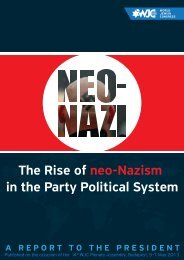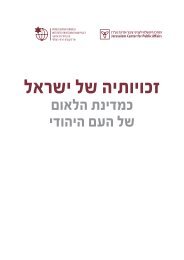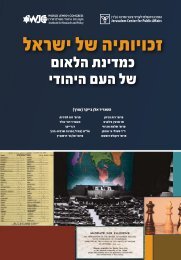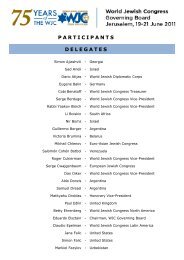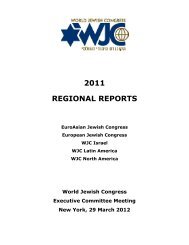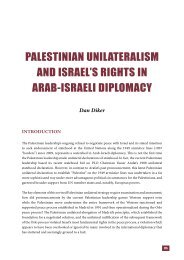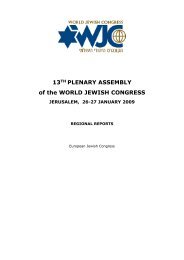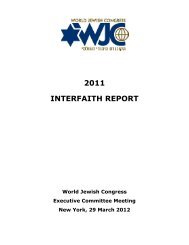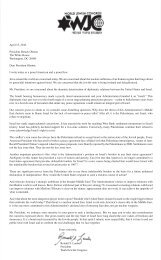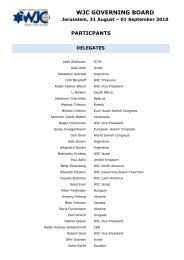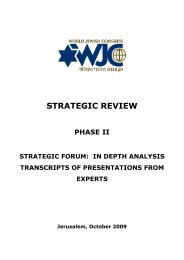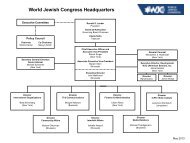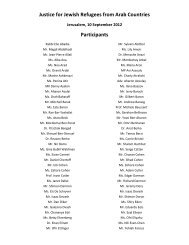Antisemitism Report 2009 - World Jewish Congress
Antisemitism Report 2009 - World Jewish Congress
Antisemitism Report 2009 - World Jewish Congress
You also want an ePaper? Increase the reach of your titles
YUMPU automatically turns print PDFs into web optimized ePapers that Google loves.
dialogue and cooperation, including several referred to above, and others such as the Adelaide-based<br />
Children of Abraham <strong>Jewish</strong>-Muslim adult education program, have been funded or subsidized by<br />
federal or state governments.<br />
"Senior parliamentarians have also attended and participated in interfaith activities. The minister for<br />
citizenship and multicultural affairs, for example, launched the ANDCMJ, and the attorney-general<br />
spoke at the inaugural Religious Leaders' Forum hosted by APRO.<br />
"Promoting models of dialogue and harmony as a means of confronting and challenging religious<br />
extremism is also part of Australia's foreign policy. The Asia/Pacific Regional Interfaith Dialogues<br />
(APRID), in which fifteen governments nominate and send delegations of religious representatives to<br />
discuss a broad range of policy matters that are conducive to the involvement of civil society<br />
representatives, originated in discussions between the Australian and Indonesian governments on<br />
their mutual concern over the development of Islamism in the region. There are now four government<br />
cohosts, Indonesia, Australia, the Philippines, and New Zealand, and dialogues have been convened<br />
in predominantly Muslim (Indonesia), Christian (the Philippines and New Zealand), and Buddhist<br />
(Cambodia) states.<br />
"In late 2007, the Australian government, with the European Union, brought youth delegations from<br />
most of the APRID participant states and the EU to the inaugural Youth Interfaith Forum in Perth,<br />
Western Australia. An impressive network of interfaith activists developed at, and since, this forum."<br />
Challenges and Threats [7]<br />
"The Muslim population in Australia is very diverse ethnically, socially, culturally, religiously, and<br />
politically. It is important to consider some general concerns regarding attitudes toward Jews, a well<br />
as a number of examples of specific concerns," Jones remarks.<br />
"Muslims in Australia overwhelmingly originate in countries where there are negligible numbers of<br />
Jews. Much of what is known, or believed, about Jews comes from the cultures, which have varying<br />
degrees of connection to Islam per se, in the places of their origin and social development.<br />
"Muslims from Somalia and Bangladesh, for example, relate stories of the cultural mythology of Jews<br />
as the cause of any and all social ills, with little or no reference to religious texts. Muslims from Turkey<br />
and the Arab Middle East will talk of The Protocols of the Elders of Zion as if it is unquestionably true,<br />
although this leads to a range of attitudes toward Jews from fear and contempt to respect. Muslims<br />
from the Arab Middle East and the more religiously educated Muslims from Asia have often been<br />
exposed to teaching that depicts Jews as historic and existential enemies of Muslims, who have<br />
distorted divine revelations and will be fighting Muslims at the End of Days.<br />
"There is little to suggest that the broad Muslim community is particularly interested in Jews. The<br />
record of coexistence would suggest that the Australian ethos of multiculturalism, as well as a<br />
generally relaxed social and political environment, is a powerful preventative against widespread<br />
intolerance. This is not to understate the problems of active promotion of antisemitism by individuals<br />
and groups within the Australian Muslim community.<br />
"It is difficult to find many examples of Muslim organizations or prominent individual Muslims in<br />
Australia who do not have views of Israel as either illegitimate or most often in the wrong in the Israeli-<br />
Palestinian or Israeli-Arab conflict. For the most part, though, such opinions do not form an important<br />
part of the policy platforms, let alone of programs. But there have been some notable, worrisome<br />
exceptions to this general rule, with antisemitism an important element when this occurs.<br />
"It is worth noting that some extreme examples of antisemitism in Arabic newspapers published in<br />
Australia, including Holocaust denial and blood libel, have been in publications run by and<br />
predominantly serving Christian Arabic speakers.<br />
139



